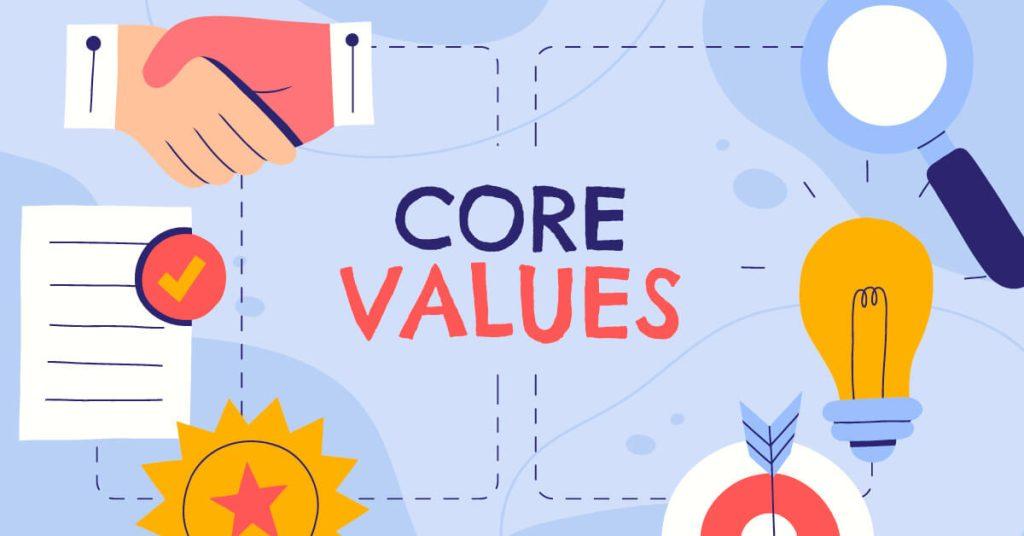Neuro-Linguistic Programming (NLP) is a discipline that focuses on how individuals perceive the world around them, communicate with others, and achieve their goals.
Values are an essential part of NLP, as they help individuals understand and align their personal beliefs and priorities with their desired outcomes. In NLP, values refer to a person’s internal motivators and drivers that shape their thoughts, emotions, and behaviors.
Values are crucial in NLP because they provide a framework for understanding the underlying motivations and priorities that drive a person’s thoughts and behaviors. By identifying and aligning with their values, individuals can gain greater clarity and focus, make more informed decisions, and achieve their goals more effectively.
One of the major principles of NLP is values—what they are and how they manage our lives. This blog will outline what values are under the NLP model and how you may utilize them in your own life.
What are Values?
NLP values are undeniable, high-level speculations that depict what is important to you. NLP values can be considered the catches that either draw in or repel us throughout everyday life. They decide whether we are going towards or away from an outcome.
To elicit NLP values, you need compatibility and mindfulness; at that point, you can utilize the key inquiry: What’s essential to you about…? This can apply to any aspect of your life. We have values in all contexts, including relationships, family, wealth, well-being, our profession, and our relationship with ourselves. The way to inspire NLP values to work with a customer includes building up what’s significant, the hierarchy of significance, and why they are significant.
Eliciting Values:
In NLP, we ask individuals to list their values and then clarify each value with a basic sentence. A similar value will mean various things to various individuals. At last, customers are approached to rank these qualities in order of their significance. Such positioning may appear to be counterfeit, yet it regularly helps settle issues.
Values and relationships:
If our core values are disregarded, we can truly feel the agony. This can prompt a wide range of troubles but at the same time offer a chance for development and change.
Understanding individuals’ value frameworks opens the route to a mutual benefit circumstance, where the two people concur on strategies that regard both sets of values. This can be the distinction that affects whether a relationship will get through the long haul or not.
The pattern of assenting, disliking, and fighting back can turn into a damaging round of tennis.” Even though your companion’s values may differ from your own, offering little lenient gestures (without disregarding your values) is a simple and extremely amazing alternative option.
Are values and beliefs the same thing?
Beliefs are grouped around values. Most values will, in general, be oblivious; beliefs are cognizant. Beliefs are the feelings that we, for the most part, hold to be valid, ordinarily without genuine confirmation or proof.
Values and beliefs are often closely interlinked. Values are frequently communicated as convictions, with genuine-sounding explanations like it’s essential to defend your family.” In any case, convictions can be moderately changed by exposing them to genuine tests.
Values are more stubborn. They may change in abrupt, extraordinary moments. Values are considerably more likely to slip down your ‘list’ over time.
Should, the ought’s, and values:
A final thought… in a similar manner as numerous different treatments, NLP quickly decreases the force of should and ought’s over individuals’ lives. Yet, aren’t values about ought to and should? Isn’t valuing honesty equivalent to saying, I ought, to be honest,
Sensibly, this may be valid. However, the tone has changed, and this matter. By expressing something as a value and respecting it, we place the energy and morals inside ourselves. We should and ought to place these things outside ourselves.
The way towards working with NLP values is an exceptionally fruitful instructing tool to facilitate a change for a customer; you can clear out the values framework and adjust the values to the customer’s objectives, setting them up to go towards the life they need as opposed to away from a daily life they don’t want.
What can you do with values? Motivate and influence!
Values are basic beliefs and concepts that influence our thoughts, actions, and decisions. Understanding and exploiting values can motivate and influence in personal and professional contexts.
Here are some examples of how values can be used to drive and influence others:
Appeal to shared values:
When talking with others, strive to identify shared values. You can raise the likelihood of the other person taking action by appealing to common values.
When encouraging others, it can be beneficial to emphasize the importance of values and how they connect to the desired objective. For example, if you want to motivate a team to work more efficiently, you could emphasize the importance of perseverance and how it leads to success.
Use values to inspire:
Values may be an invaluable source of inspiration and motivation. You may inspire others to do the same by sharing stories and examples of people who have followed their principles and accomplished remarkable things.
Align your actions with your values:
If you are in a position of leadership or influence, it is critical that your actions reflect your ideals. Others are more likely to follow your lead if they see you behaving according to your ideals.
Values can motivate and influence others. You may build a sense of connection, motivate action, and achieve desired objectives by appealing to shared values. This is done by emphasizing their importance, using them as a source of inspiration, and aligning actions with values.
Creating a meaning map:
A client might respond, “Freedom.”
We could then inquire as to which freedoms would enable you to obtain.
The freedom to design the life of my dreams, they might respond.
You might want to consider the following questions:
- What else is essential to you, for example?
- Could you please further explain?
- What are your thoughts on this?
- How does that make you feel?
FAQ’s
Conclusion
In summary, values are an important part of NLP because they help individuals to understand their internal motivations and drivers, which in turn can help them to achieve their goals and live a more fulfilling life.
NLP for Values Transformation?
Neuro-Linguistic Programming (NLP) Master Practitioner for Values Realignment is an immersive training program designed to help individuals enhance their personal and professional growth. Our training is specifically focused on realigning an individual’s value system so that it is more congruent with their goals and aspirations. We provide our participants with the tools and techniques necessary to identify and understand their current value system and then transform it to better reflect their true selves. Our expert trainers are highly skilled in the application of NLP techniques and will guide you through a process of self-discovery and transformation that will empower you to achieve your full potential. Whether you are looking to improve your relationships, enhance your career, or achieve a greater sense of purpose in your life, our NLP Master Practitioner for Values Realignment training can help you get there. Join us today and take the first step towards a more fulfilling and authentic life!


